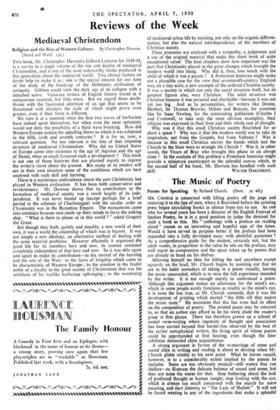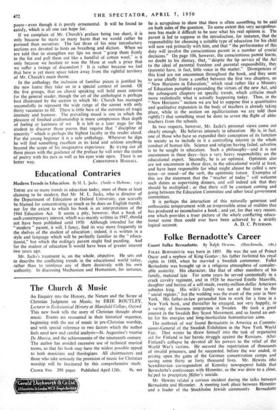' The Music of Poetry
Poems for Speaking. By Richard Church. (Dent. 7s. 6d.) MR. CHURCH is concerned with lifting poetry off the page and restoring it to the lips of men, where it flourished before the printing press began circulating books in silence from eye to eye. As one who for several years has been a director of the English Festival of Spoken Poetry, he is in a good position to judge the demand for such a book as this. His "anthology with a preface on reading aloud" comes as an interesting and hopeful sign of the times. Would it have served its purpose better if the preface had been expanded into a fully developed essay with plentiful quotation ? As a comprehensive guide for the student, certainly not, but the adult reader, in proportion to the value he sets on the preface, may well regret its compression and the space taken up by poems that are already to hand on his shelves.
Allowing himself no time for hitting the nail anywhere except squarely on the head, Mr. Church begins by pointing out that we are in the habit nowadays of taking in a poem visually, leaving the music unsounded, which is to miss the full experience intended by the writer. It is not enough merely to understand a poem. Although this argument makes no allowance for the mind's ear, which in some people surely functions as readily as the mind's eye, it is none the less true, as Mr. Church contends, that it was the development of printing which started "the little rift that makes the music mute." He maintains that this has even had its effect on the composition of poetry. The printed poem may be returned to, so that an author can afford to let his work elude the reader's grasp at first glance. There has therefore grown up a school of muted verse-writing where ingenuity of thought and association has been carried beyond that border-line observed by the best of the earlier metaphysical writers, the living spirit of whose poems could be apprehended at first hearing, even though the finer subtleties demanded close acquaintance.
A strong argument in favour of the re-marriage of sense and sound alike in writing and reading is about to develop when Mr. Church glides nimbly to his next point. What he leaves unsaid, however, is to a considerably extent implied by the poems he includes. Some are too obviously musical—still waters that run shallow—to illustrate the delicate balance of sound and sense, but they are none the worse for that. Stop bothering about the lack of profound thought or human insight, stop looking with the, eye, which is always too much concerned with the search for mere meaning, and start listening to "The Lady of Shalott." It will not be found wanting in any of the ingredients that make a splendid poem—even though it is purely ornamental. It will be found to satisfy, which is all one can hope for.
If we complain of Mr. Church's preface being too short, it is only because he starts so many hares that we would rather he pursued than ourselves. The last three of his nine introductory sections are devoted to hints on breathing and diction. When we are told that to strengthen our lips we must "grasp them firmly in the fist and pull them out like a handful of cotton wool," is it only because we hesitate to woo the Muse at such a price that we suffer a twinge of discomfort ? It is rather because we feel that here is yet more space taken away from the rightful territory of Mr. Church's main theme.
In the anthology the inclusion of familiar pieces is justified by the new lustre they take on in a special context of sound. Of the five groups, that on choral speaking will hold most interest for the general reader, though the art of the anthologist is perhaps best illustrated by the section in which Mr. Church has managed successfully to represent the wide range of the sonnet with only thirty vacancies to fill. There is little here of the extremes of tragic intensity and humour. The prevailing mood is one in which the pleasure of finished craftsmanship is more conspicuous than depth of feeling or keenness of wit It is left to a later stage for the student to discover those poems that require that "discipline of sincerity" which is perhaps the highest faculty in the reader aloud. For the young beginner it is a safe anthology. Wherever he dips he will find something excellent in its kind and seldom anything beyond the scope of his imaginative experience. By trying out all these pieces with the guidance of the preface he will enter the realm of poetry with his ears as well as his eyes wide open. There is no







































 Previous page
Previous page